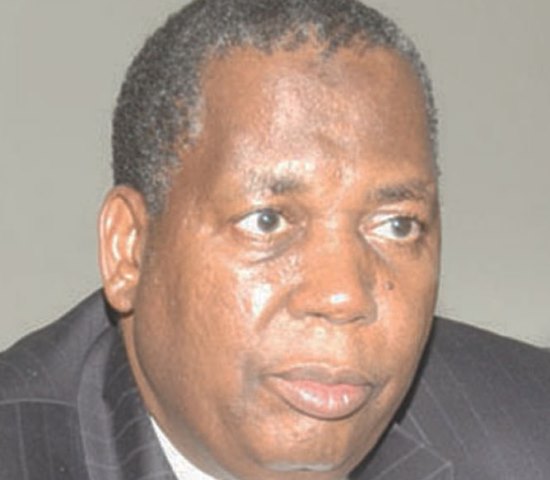E-Financial
Ibrahim, NDIC Boss Pledges Zero Tolerance for Corruption in Its Operations

The Nigeria Deposit Insurance Corporation (NDIC) as a key component of the Nigerian financial safety-net arrangement, has zero tolerance for corruption and all forms of malpractices within the Corporation and in the implementation of its mandate and activities.
Umaru Ibrahim, NDIC’s Managing Director/Chief Executive, represented by Hon. Omolola Abiola-Edewor, Executive Director (ED) Corporate Services, stated this during the inauguration of four new members to the Corporation’s Anti-Corruption and Transparency Unit (ACTU) by the Chairman of the Independent Corrupt Practices and Other Related Offences Commission (ICPC) at the Corporation’s Head Office in Abuja.
Hon. Abiola-Edewor said the Corporation has established a culture of zero tolerance for corruption by implementing strict operational procedures and guidelines that are geared towards instilling transparency and accountability in the work place.
She described the inauguration of the new members to the Corporation’s ACTU as an extension of the NDIC’s commitment towards maintaining high anti-corruption standards which had been imbibed by the Corporation’s employees and strengthened by the core values of honesty, respect and fairness, discipline, professionalism, teamwork and passion.
She added that ACTU of the NDIC had been involved in the preliminary investigation and collaboration with ICPC, sensitization of the Corporation’s members of staff, identification and improvement of internal controls to avert fraudulent practices through the thorough analysis of its systems, as well as by ensuring maximum compliance with its policies and procedures.
She concluded by stating that the inauguration of the new members further strengthened the Corporation’s partnership with the ICPC and other government agencies involved in the anti-corruption fight towards promoting credible and effective service delivery in the public sector.
The Chairman of ICPC, who was represented by an Assistant Director and Head of ICPC Anti-Corruption Unit, Mr Justin Kuatsea, said ACTU was created in ICPC in 2001 and established in other Government Agencies to curb corrupt practices as well as to implement transparent processes and procedures in the public sector.
He expressed the belief that the addition of new members to the unit would improve synergy and effective collaboration between the unit, NDIC and the ICPC. He therefore commended the NDIC for its commitment to transparency and accountability both in its operations and in the banking sector.
It would be recalled that the ACTU was established in the Corporation in 2006 and was reconstituted in 2018. The new members were therefore appointed into the Unit to replace the former members.
E-Financial
NIBSS Heads to Court to Recover N4Bn Lost due to System Glitch

Nigeria Inter-Bank Settlement Systems (NIBSS) PLC has approached a Federal high court in Lagos to salvage the sum of N4.1 billion vanished from it coffers due to system glitch.

NIBSS filed the suit before the court and joined 45 other financial institutions as defendants.
The applicant is urging the court to issue an order mandating the respondent’s financial institutions and the named banks to immediately place a Post No Debt restriction on all the accounts of the beneficiaries.
According to an affidavit sworn to buy Patience Johnson, a litigation officer at Manifield Solicitors and filed before the court by her law firm, the deponent alleged:
The Applicant Nigeria Inter Bank Settlement System PLC is a duly registered company with the Corporate Affairs Commission and licensed by the Central Bank of Nigeria to provide a mechanism for clearing and settlement of interbank transfers and payments.
However, on the 6th day of September 2024, the Applicant experienced a system glitch that affected the Applicant’s Instant Pay (NIP) engine, resulting in an unexpected behavior that allowed customers of the financial institutions named before the court as respondents to initiate the unauthorized transfer of funds to various accounts.
The unauthorized transfer transactions covered a period between 6th September 2024 to 9th September 2024, and this occurrence was observed at about 12.30 pm on Monday, 9 September 2024. In the course of concluding the settlement for the NIP Transaction conducted over the weekend,
These transfers were routed to 176 accounts residing with the respondents.
The financial exposure of the Applicant from this incident is in the sum of N13,662,138,920.00 (thirteen billion, six hundred and sixty-two million one hundred and thirty-eight thousand nine hundred and twenty naira only). Details of the fund and respective accounts with the Respondents had been filed before the court.
The Applicant, having observed the transactions, immediately took steps to contact the respondents, requesting that a Post No Debt status be placed on the respective accounts where the funds had been traced
Further investigation in collaboration with relevant stakeholders, regulatory bodies, and law enforcement agents revealed a further attempt to dissipate the funds to a previously unknown set of beneficiaries who are domiciled with the respondents
The funds dissipated to the new set of beneficiaries amount to N4 190 101 636 (Four billion one hundred and ninety million, one hundred and one thousand six hundred and thirty-six naira).
The funds dissipated to another set of beneficiaries amounting to the sum N8 151 388 207.70 Eight billion one hundred and fifty-one million three hundred and eight-eight naira thousand two and seven naira seven kobo). The details of the fund and respective accounts with the respondents are as set out in Exhibit filed before the court.
Without the intervention of the Court, the funds which form the subject matter of this suit may be irretrievably dissipated.
The Applicant is fully aware that its interest can only be protected by restriction of the accounts to the tune of the sums received to avoid dissipation of the funds which could lead to a total loss of these funds.
By virtue of the CBN Circular of 13th September 2018 on the regulation of instant (Inter-bank) Electronic Funds Transfer and by Clause 10 of the CBN Regulation on Instant (inter-bank) Electronic Funds Transfer Services in Nigeria, 2018, NIBSS is entitled to block of the accounts and the cooperation the banks to recover the funds.
Consequently the Applicant seeks the Order of the Court to place restrictions and a Post No Debit (PND) status on the said funds pending the determination of the instant suit
E-Financial
Africa Loses $88.6Bn Yearly to Corruption- ECOWAS

Economic Community of West African States (ECOWAS) has raised the alarm over Africa’s staggering loss of $88.6 billion each year due to corruption and illicit financial flows (IFFs), calling the issue one of the most pressing threats to the continent’s development.

Speaking at a recent certification training on financial investigation for West Africa’s anti-corruption institutions, Ambassador Abdel-Fatau Musah, ECOWAS commissioner for political affairs, peace, and security, stated that these losses account for 3.7% of Africa’s GDP and continue to undermine democratic governance and stability across the region.
Despite “considerable progress in the democratic consolidation in the region … democracy in most of our member state faces fragility, particularly due to the menace of corruption,” Musah noted.
He stressed that the rise of cryptocurrencies and other online financial tools is creating new vulnerabilities, making it vital for anti-corruption agencies to upgrade their skills and strategies.
The training, organized in partnership with Economic and Financial Crimes Commission (EFCC) and the Network of Anti-Corruption Institutions in West Africa (NACIWA), aimed to bolster regional capacity to combat increasingly tech-enabled and transnational financial crimes.
echoed the call for unity, stating that “to effectively confront these challenges, we must work together, sharing intelligence, harmonizing our methods, and speaking in one voice as a region committed to integrity and justice.”
As ECOWAS pushes toward its Vision 2050 goals, leaders say tackling corruption is essential to unlocking economic growth and restoring trust in governance across West Africa.
E-Financial
SEC Bans Unregistered Digital Asset Exchanges, Online Forex Platforms

Securities and Exchange Commission (SEC) has banned digital asset exchanges or online foreign exchange trading platforms without formal registration.

It highlighted that the newly enacted Investments and Securities Act, 2025 (ISA 2025) makes it illegal to operate digital asset exchanges or online foreign exchange trading platforms without formal registration with the Commission.
Signed into law by President Bola Ahmed Tinubu, ISA 2025 significantly strengthens the regulatory framework governing Nigeria’s capital market, with a particular focus on digital finance.
The SEC clarified in a statement released over the weekend that, in accordance with the new law, it is now an offence for any entity to operate an online forex trading platform or provide related services without prior registration with the Commission.
“By virtue of this Act, it is an offence in Nigeria for any entity that is not registered by the Commission to carry out the business of online foreign exchange trading platforms or related services.
“Any business entity with the plan of setting up a business in any of these areas is advised to visit the HOD DRM Department of the Commission for further directives on how to register with the Commission to avoid sanctions”, the Commission added.
The Commission noted that “under the newly enacted legislation, the Securities and Exchange Commission (SEC) is now empowered to regulate a broader scope of market activities as Section 3(3)(b) of the Act explicitly mandates the Commission to “register and regulate securities exchanges, commodity exchanges, virtual and digital asset exchanges, and other market venues.”
Speaking on the development, Dr. Emomotimi Agama, director general of the Commission, described the new law as “a landmark step in positioning Nigeria’s capital market to be more inclusive, robust, and in tune with global best practices.”
He stated, “The ISA 2025 has given the Commission the legal backing to provide clarity, ensure investor protection, and enhance market confidence, especially in new and previously unregulated segments such as digital asset exchanges and online foreign exchange platforms.”
The Commission reaffirmed its commitment to supporting innovation while maintaining strict oversight. “We welcome innovation, but it must occur within a regulated environment that protects investors and maintains the integrity of our market.
“With ISA 2025 now in force, stakeholders in the financial and investment ecosystem are advised to familiarise themselves with the new provisions and ensure full compliance,” Agama stated.

 Telecom3 days ago
Telecom3 days agoMTN Plans Second Public Offer in Nigeria

 Broadcasting3 days ago
Broadcasting3 days agoSubscriber Withdraws Suit against MultiChoice, FCCPC over Price Hike

 E-Business3 days ago
E-Business3 days agoCyberattacks: ‘56 Percent of Cases Stem from Existing Logins

 News3 days ago
News3 days agoSenate Committee Partners with Kuda Bank to Tackle Compliance Crisis as Nigeria Loses ₦3.4 Trillion

 E-Business3 days ago
E-Business3 days agoKaspersky Presents Insight on 14% Increase in Spyware Attacks on Businesses in Africa @ GITEX Africa

 E-Financial3 days ago
E-Financial3 days agoSterling Bank Reiterates Transfer Fees Removal

 General News3 days ago
General News3 days agoOpenAI Sues Elon Musk Claiming Bad-Faith Tactics

 General News3 days ago
General News3 days agoFG Unveils e-Visa, Digital Entry Cards to Strengthen Border Security


























